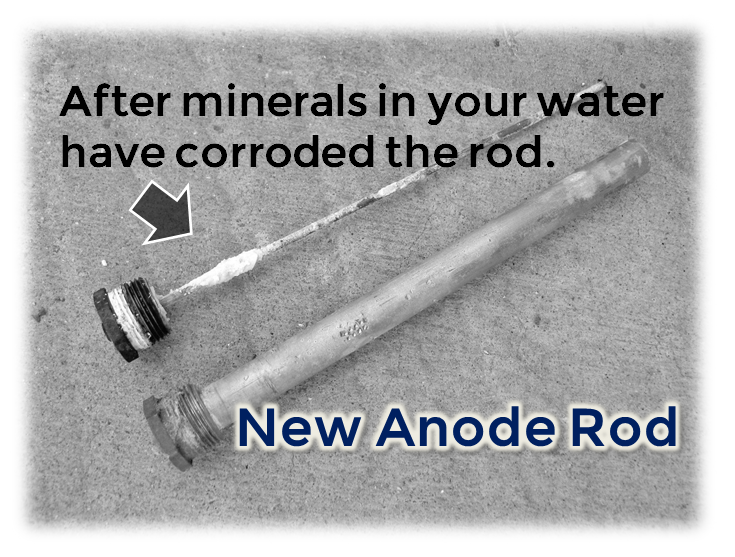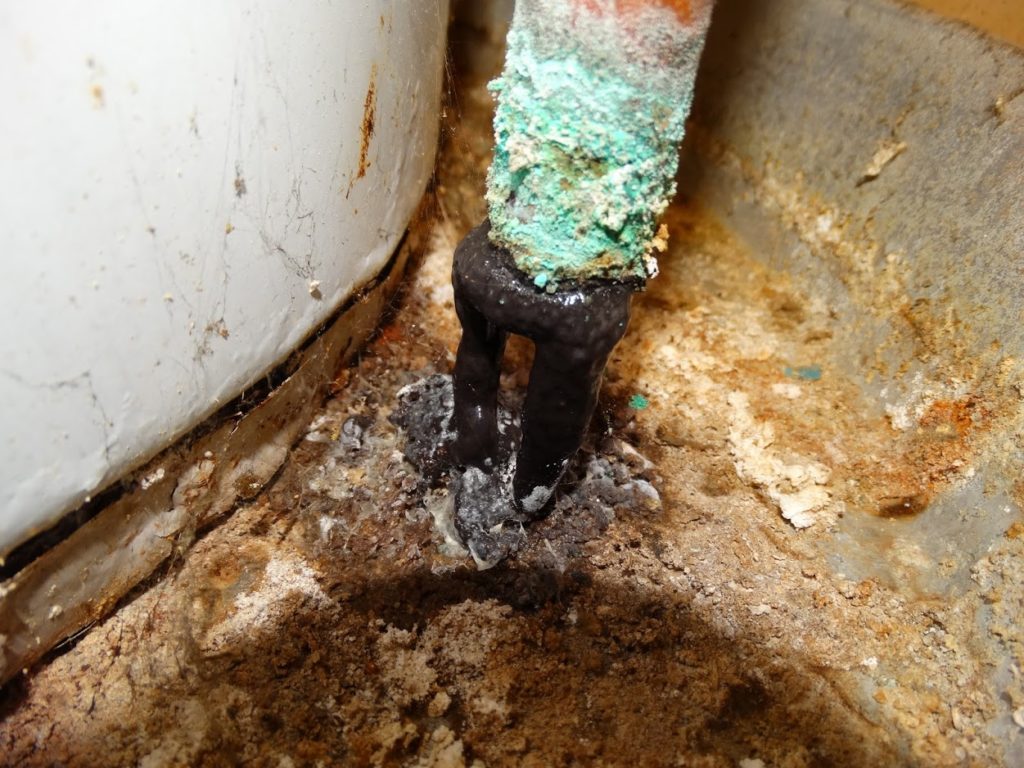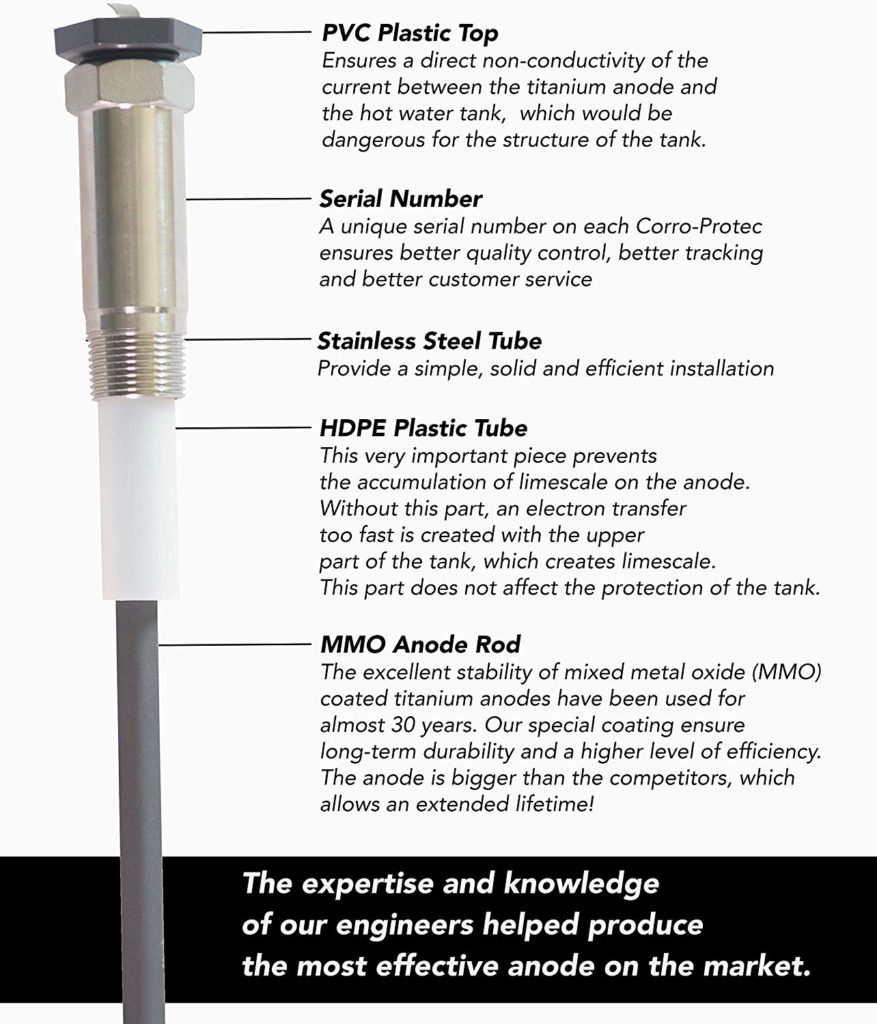Do you have a tank-style water heater? The tank itself is made of metal. Minerals in water degrade the metal, and sometimes that downright stinks!
A water heater sacrificial anode rod is a metal rod screwed into the top of the tank. Its job is to attract corrosive elements in your water. Over time the rods get “sacrificed” for the healthy survival of the tank, and the result can lead to water with a foul odor.
Magnesium or Zinc Anode?
Magnesium rods work better than aluminum/zinc anode, but they generally don’t last as long. The rod is an essential component for protecting the tank from galvanic corrosion – an electrochemical process in which one metal corrodes preferentially when it is in electrical contact with another in the presence of an electrolyte. Learn More Here

The rods can deteriorate in as little as 3 to 5 years, depending on many factors, including the hardness or softness of the water.
Without a working anode rod, the water heater tank will be vulnerable to rust, corrosion, and other damaging effects of chemicals and minerals in the water supply.
Home Maintenance Tasks That Don’t Require Tools
Here are my 10 signs you should replace your water heater anode rod.
Number 1 – Having a healthy rod installed in the tank will extend the lifespan of your tank. It costs much less to replace an anode rod than an entire water heater. Inspect it often to save money buying a new appliance.
Number 2 – Do you have water softeners? They can accelerate anode rod corrosion. You’ll want to check the rod more frequently if you have a water softener (about once a year). Ask your plumber about non-sacrificial, electrical anode replacements as an alternative to sacrificial anodes and help reduce limescale.
Number 3 – Acidic water can accelerate anode rod corrosion. If you have acidic water, check your anode rod more frequently (about once a year).
Number 4 – When heating water, the water heater makes loud or multiple popping or crackling noises. The noise can signal sediment in the tank.
Number 5 – Your water heater is more than 5 years old. You can check the label on the side of your water heater to discover its age. Sometimes, the water heater’s age is hidden in an alphanumeric code. Check the water heater manufacturer’s website for instructions on reading the serial number.
Here’s my A-Z appliance age look-up site! water heater age
Number 6 – Your faucet aerators appear to clog more frequently, or you notice a slimy gel substance when cleaning the faucet aerator. The aerator is the screen on the end of the sink spout.

Number 7 – Your hot water emits a “rotten egg” odor. This unpleasant odor is caused by high levels of sulfur bacteria (Hydrogen Sulfide). The smell is often accompanied by brown or black (dark) water.
Number 8 – Water is colder or not as hot as usual. The cause can be a failing heating element (in electric water heaters), broken down parts, or excessive sediment at the bottom of your unit. The sediment settles down near the burner (on a gas model), and the burner won’t heat the water as quickly or struggles to do so.
Check out this video (of an electric tank) from Matt Risinger, showing the effects of sediment build-up. Sediment will prevent your water heater from doing its job – making hot water.
Number 9 – When your sacrificial anode rod is nearing the end of its life, corrosion can begin to occur in your tank. If you notice rusty-looking water, corrosion could be the cause. Contact a plumber immediately before cracks and leaks start to develop.
Number 10 – One obvious sign of a problem with your water heater is simple – you see a leak, cracks, and corrosion. This can show up as a rusted pan, rust spots on the floor, or signs of brown or rust-colored runs and stains near the heater.
If you see water around your water heater, contact a professional plumber ASAP. You don’t want to wait until the tank bursts to seek professional help!
Join my 9,000+ member Facebook group for homeowners and inspectors.
Cover photo by RVgeeks

- - - - - - - - - - - - - - - - - - - - -
One thought on “Smelly Water – One of 10 Signs Your Water Heater Anode Rod Could Need Changing”